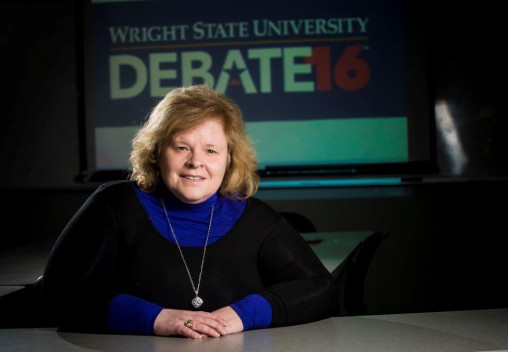
A communication class, led by professor Melissa Spirek, will monitor how the public discusses the presidential debate at Wright State on Sept. 26 on Twitter. (Photo by Erin Pence)
The statements of the candidates during the first presidential debate will be carefully monitored and then tracked on social media to measure the impressions and opinions of voters as part of a Wright State University communication class.
“The excitement and the key of this course is that my students are making history,” said Melissa Spirek, professor of communication. “We are going to replicate and extend the original study that looked at the implications of the audience members who watched the Kennedy-Nixon debate versus those who heard the debate over the radio.”
Wright State will host the first presidential debate on Sept. 26. The debate is expected to be in the glare of the national and international spotlight and attract thousands of media members.
Spirek said it will be the first time voters will see the presidential nominees face off against each other on the national stage and be able to compare their performances.
“This is the first interaction, so you’re seeing the candidates’ priorities and what each is bringing to the table,” she said. “After the first debate, you tend to have an indication of what direction, style, technique, strengths and weaknesses are going to be addressed going forward.”
And southwest Ohio is important for the candidates because it will involve a rich urban/rural, socio-economic, military-civilian, culturally diverse cross-section of local voters in an important swing state, Spirek said.
“The candidates are going to have to be on their game in order to address a number of topics,” Spirek said. “We’re going to be in for a ride.”
Spirek expects reporters to cover the debate like a sporting event.
“I’m going to look for game changers,” she said. “What are turning points? Common themes. Disagreements. Looking at who’s drawing from experience.”
Spirek’s students will watch the debate while monitoring how it is being discussed on Twitter. They will track the Twitter responses to themes in the debate and measure how Republicans, Democrats, Independents and members of the audience process the information.
“I think it’s going to be a wonderful case of issues versus image,” Spirek said. “How does one win? That’s what we’ll be analyzing. Like or dislike the person, how did they perform during that debate and why?”
The project was inspired by an experiment that found that those who listened to the 1960 Kennedy-Nixon debate on the radio thought Nixon won, while those who watched the debate on television thought Kennedy won.
The hows, whys and implications of winning the first presidential debate are all part of Spirek’s Presidential Debates class.
The faculty at Wright State has created a wide array of debate-related classes for students. Other courses include The 2016 Presidential Election, Political Parties, Politics and Ethics, Social Movements and Change, A Non-Western View of the American Political Process and Politics and Nationalism.
“It’s fascinating to watch the breadth of the impact on our campus,” said Donna Schlagheck, professor emerita of political science who led the effort to land the debate at Wright State. “At a time when there is a lot of apathy and a lot of suspicion of government, this is the very best place to begin enriching the preparation of our students.”
Spirek’s students will not only watch other debates but also study the scholarly literature. Among scholars to be studied will be the late Sidney Kraus, who wrote the first book on televised presidential debates. He believed that debates were about winning, not educating the public nor about arriving at the truth.
A strong advocate of having presidential debates, Kraus applied the theory of communication to debates to measure their outcomes. He believed that debates offered the American public views of the candidates they were not likely to see any other way.
Spirek was one of Kraus’ students when she was at Cleveland State University and will use her class notes as a source of information for her Wright State class.
Spirek’s students will also interview top scholars in the field of political communication, investigating their work and findings.
“The focus of this is going to be looking at techniques over a period of time that have been used to measure both debate content and image to see if there has been an actual shift in what is presented at debates and how it’s presented,” she said.
One of the scholars will be Denise Bostdorff, presidential rhetorician and chair of the communication department at the College of Wooster. Bostdorff, who has had students go on to become presidential speechwriters, will share her analyses of presidential speeches.
“We’re going to be looking at the Wright State debate not only from a media-channel component but also to gauge the impact and effect of the elements of rhetoric,” Spirek said.

 Bottom Line, Wright State partnership aims to increase access to college
Bottom Line, Wright State partnership aims to increase access to college  Wright State’s nursing program celebrates 50th anniversary
Wright State’s nursing program celebrates 50th anniversary  Wright State celebrates Student Success Champions
Wright State celebrates Student Success Champions  Wright State gold team captures 2024 Horizon League team title, Flynn individual champion
Wright State gold team captures 2024 Horizon League team title, Flynn individual champion  118 medical students to graduate from Wright State’s Boonshoft School of Medicine April 28
118 medical students to graduate from Wright State’s Boonshoft School of Medicine April 28 